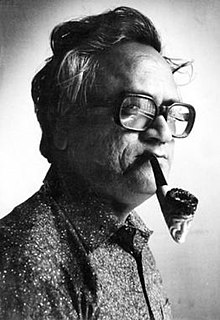Akhteruzzaman Elias
This article relies largely or entirely on a single source. (June 2012) |
Akhteruzzaman Elias | |
|---|---|
 | |
| Native name | আখতারুজ্জামান ইলিয়াস |
| Born | February 16, 1943 Gotia, Gaibandha District, British Raj (now Bangladesh) |
| Died | January 4, 1997 (aged 53) |
| Occupation | novelist, short story writer |
| Nationality | Bangladeshi |
| Education | Master of Arts |
| Alma mater | University of Dhaka |
| Notable works | Khoabnama, Chilekothar Sepai |
| Notable awards | Bangla Academy Award (1983) Ekushey Padak (1998) |
Akhteruzzaman Elias (Bengali: আখতারুজ্জামান ইলিয়াস; February 16, 1943 – January 4, 1997),[1] born in Gaibandha District, was a Bangladeshi novelist and short story writer.[2] Though he wrote only two novels, critics place Elias in the pantheon of great Bengali novelists.
Early life and education
Elias was born at his maternal uncle's home in Gotia village in Gaibandha District.[2] His paternal home was in Chelopara, near Bogra. His father, Badiuzzaman Muhammad Elias, was a member of the East Bengal Provincial Assembly and Parliamentary Secretary of the Muslim League.[2]
Elias completed his Matriculation from Bogra Zilla School in 1958,[3] Intermediate from Dhaka College in 1960, and BA (Hons) and MA from the University of Dhaka in 1964.
Career
Elias started his career as a lecturer at Jagannath College and worked there till 1983.[2] He also worked subsequently as Deputy Director, Directorate of Primary Education, Vice-Principal of Music College, and Professor and Head of the Department of Bengali at Dhaka College.[2]
Novels
- Chilekothar Sepai (The Soldier in the Attic) (1987) - details the psychological journey of a man during the turbulent period just prior to Bangladeshi independence in 1971. This novel also contains what is arguably the most authentic description of life in Puran Dhaka, the old and distinctive part of Dhaka.
- Khoabnama (Tale of Dreams) (1996) - Khoabnama depicts the socio-political scene in rural pre-partition Bangladesh.
Short story collections
- Dojokher Om (The Warmth of Hell)
- Dudhbhate Utpat (No Peace in Milk and Rice)
- Onno Ghore Onno Shor (Another Tune in Another Room)
- Khoari (Hangover)
- Jal Shopno, Shopner Jal
Essay collections
- Shongskritir bhanga shetu (Broken Bridge of Culture)
Awards
- 1977 : Humayun Kabir Smrti Puraskar
- 1983 : Bangla Academy Award in Literature
- 1987 : Alaol Sahitya Puraskar - Chilekothar Sepai
- 1996 : Ananda Puraskar - Khwabnama
- 1996 : Saadat Ali Akhand Puraskar - Khwabnama
- 1996 : Kazi Mahbubullah Gold Medal - Khwabnama
- 1999 : Ekushey Padak (posthumous)
References
- ^ Ekbal, Nikhat (2009). Great Muslims of undivided India. Gyan Publishing House. p. 270. ISBN 8178357569.
- ^ a b c d e Shafiul Alam (2012). "Elias, Akhteruzzaman". In Sirajul Islam and Ahmed A. Jamal (ed.). Banglapedia: National Encyclopedia of Bangladesh (Second ed.). Asiatic Society of Bangladesh.
- ^ Md.Mahbur Rahman (August 5, 2006). "From Bogra : A Successful Seat of knowledge". The Daily Star. Retrieved December 29, 2015.
External links
- Bengali-language writers
- Bengali novelists
- Bangladeshi male novelists
- 1943 births
- 1997 deaths
- Dhaka College faculty
- Dhaka College alumni
- University of Dhaka alumni
- Recipients of Bangla Academy Award
- Recipients of the Ananda Purashkar
- Recipients of the Ekushey Padak
- 20th-century novelists
- People from Bogra District
